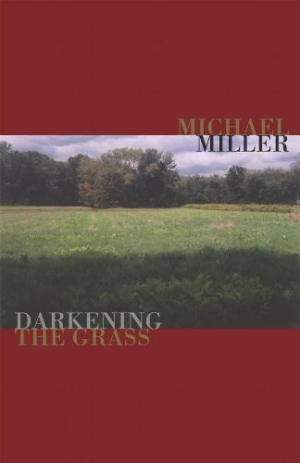Darkening the Grass
Married love, the simple satisfactions of daily routines and habits around the home and garden, light and darkness, and ruminations about aging and dying give this third collection by Michael Millar substance and form. There are also poems that refer to military service in Vietnam, as well as a series about deployed soldiers in current wars, which provide a backdrop for the moments of particular poetic clarity on the theme of what really matters in the end: “Now there is this: the coffee / To make, the newspaper to read, / And tulips to be picked / And savored for their / Short-lived tenure.”
CavanKerry Press has released Darkening the Grass as part of its Emerging Voices Series, a project aimed at advancing the careers of early and midcareer poets. While Miller’s perspective is mature and his voice characterized by the steadiness and calm of an elder, the work seems green in certain formal respects. And while the poems aren’t overwritten, as such—most tend toward brevity on the page—there is an excess of personal comment. Why not simply write what is and leave it to the reader to deduce the meaning? This urge to say too much, or know what can’t actually be known, is noticable in the second section of the book, an eight-part poem about Old Bill, a ninety-some-year-old man who taunts death by eating red meat and butter, and who will take his hoard of stockpiled pills if his wife dies before he does.
Still, there is a comfort in the atmosphere of many of these poems because they primarily occur in the context of a happy domestic scene, which includes a life-long wife, songbirds, and many flowers and grasses. Indeed, one of Miller’s strengths is his descriptions of the natural world: “Listen to the black-masked cardinal,” he writes, “Look closely at the clusters of lilies / unfolding like tongues of gold.”
Miller is a poet of the heart, and his eyes and insights are suited to the lyrical mode. One of the most memorable and successful poems is an eight-liner entitled “Marriage,” which appears near the end of the collection. In it, the speaker likens the leaves on a gingko tree to fans that might cool his wife on a sultry summer’s day, “Just as in winter when she shivers / He warms her with each / Essential part of him.” Here, Miller has found the objective correlative, adding little additional comment after noting the natural opposite of an image that is exactly right for the occasion.
Reviewed by
Holly Wren Spaulding
Disclosure: This article is not an endorsement, but a review. The publisher of this book provided free copies of the book to have their book reviewed by a professional reviewer. No fee was paid by the publisher for this review. Foreword Reviews only recommends books that we love. Foreword Magazine, Inc. is disclosing this in accordance with the Federal Trade Commission’s 16 CFR, Part 255.

